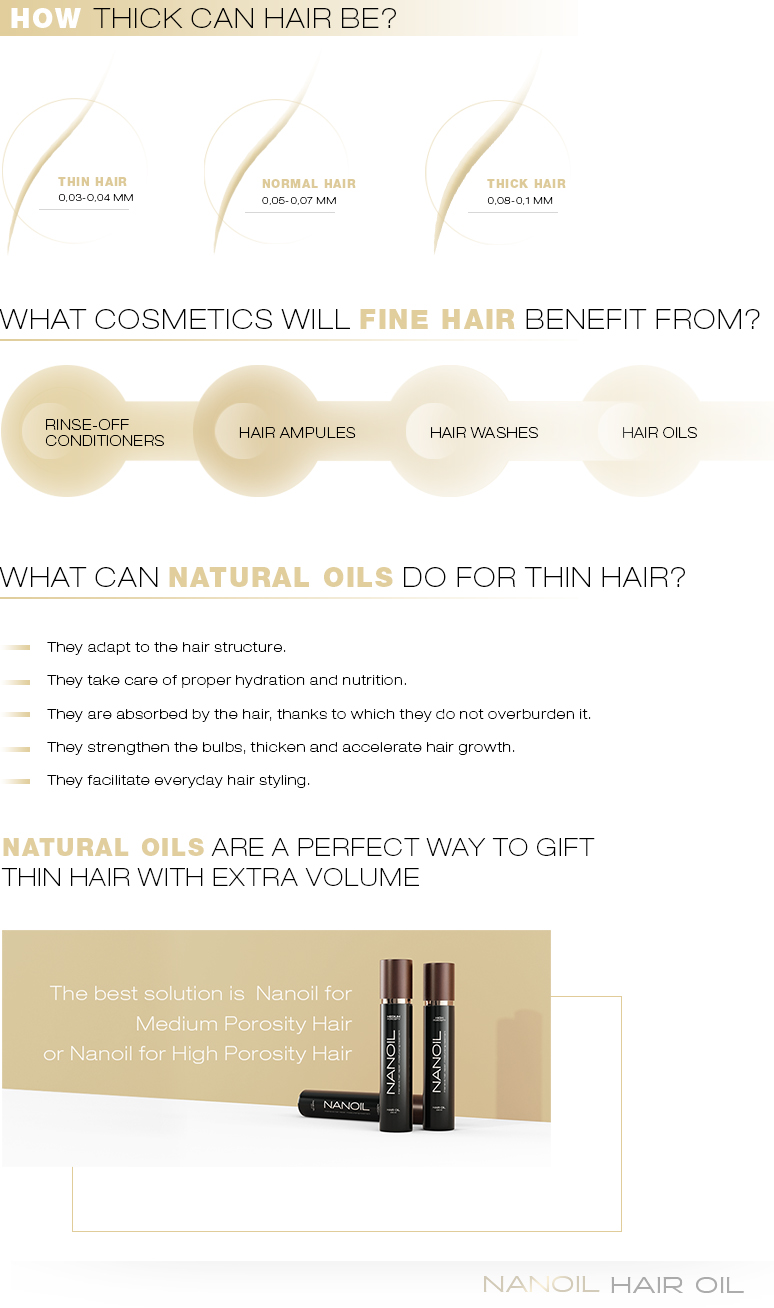- NANOIL Products
- Oils
- Face serums
- Hair masks
- Shampoos
- Hair conditioners
- Hair styling
- Care
- Hair Porosity Test
- Blog
- Contact

Thin hair is the problem touching many women, including celebrities. What should we do when our hairdo is deprived of volume? The best way to deal with thin hair is a special care delivered to the strands and get an appropriate haircut. Find out what thin hair dislikes.
One of the most frequently asked questions on the Internet is: 'Why is my hair so thin?' Actually, this is a very good question! Before we start seeking solutions for this particular problem, we need to learn its origins. More often than not we assume that hair is thin because our scalp houses just a handful of it.

It turns out that defining hair type is considered as rather troublesome. How to recognize that hair is thick? Frequently, it is the hair volume that we consider as the indicator, yet it does not entirely reflect the real state of matters. We tend to say that we have little hair, so it seems thin to us. In fact, this is not the best process of deduction because it is the thickness of hair that matters, not its amount. It is worth knowing the difference between thin hair and thinning hair.
Thin hair has approximately 25% smaller diameter than normal hair. Therefore, it may seem that there is less of it on the head. It happens that this conviction has its justification in reality because thin and delicate hair has the tendency to fall out excessively. However, it is not a rule that people featuring thin hair have less of it. It is the thickness of hair that makes hard to create a full of volume hairdo. And this is not everything you should be aware of.
It's the thickness of the outer layer of hair (cuticle layer) that influences the thickness of the entire hair. The outer coat may consist of 4-12 layers of keratin cuticles that are bonded tightly together. Thin hair features considerably less cuticles, there is less keratin to build this type of hair so it has tendency to reach higher porosity. In general, this is the very reason why such hair is so delicate. It is easy to describe this issue by presenting the following example. A healthy and thick hair is able to bear weight of 160-250g whereas a thin hair bears just 25-40 g, which is almost over 6 times lighter burden.
Thin hair can be long, too. It is high time to debunk the myth that this type of hair looks good only when cut short. That is far from being true because it is possible to get a pretty hairdo while having long and thin strands. Therefore, instead of crying over our fate, it would be better to take the matters into our own hands and seek help by finding out how to reinforce thin hair.
How to take care of thin hair? Actually, care delivered to thin hair does not differ much from standard hair conditioning. All the basic rules of proper hair care apply here as well as delicacy is found fairly crucial. The most important though is to provide constant protection and reinforce thin hair because it is way weaker and definitely more damage-prone.
Regardless of how often we wash our hair (every day or every few days), we should use only appropriate cosmetics for the procedure. What is the best shampoo for thin hair? Certainly, the one which gifts hair with volume and has a light, non-overburdening formula. The ingredients that thin hair dislikes are: alcohols (they dehydrate), silicones (plaster hair), aggressive detergents and preservatives (cause irritations). On the other hand, thin hair adores delicate ways of cleansing such as CWC method (conditioner - washing - conditioner).
What is worth realizing, frequent use of dry shampoo is not considered as a good idea, despite being recommended for boosting hair volume. This powder can react with sebum, irritate and create an impervious layer that prevents oxygen from accessing the scalp. To make matters even worse, it is hard to remove the dry shampoo layer completely.
You should not fret that higher temperature might weaken already thin hair as long as you provide the strands with the right protection. If we let the hair become air-dried, it is highly possible that it will lack volume. However, if we make our hair dry with keeping our head down, we will lift the hair up at its roots and gift it with volume. The most important rules - before hair drying, you need to shield the strands using, for example, a natural oil, and when it comes to the very device used for the procedure, you should keep the blow-dryer in 6-7 inch distance from hair and set lukewarm air stream.
Thin hair likes variety, therefore, there is no single kind of conditioning products dedicated to it. Essential vitamins and minerals can be delivered to hair by many means, yet always turn to the natural ones. Considerable amount of chemicals, alcohols, parabens and synthetic ingredients will not help us achieve the desirable goal. Instead, these are home remedies which serve thin hair well (e.g. hair washes). What to treat thin hair with? Here are the most popular products worth reaching for in day-to-day thin hair care.
However, the best is hidden in natural oils!
Of course, it can. It is worth taking advantage of hair oils because they are the best solution for treating thin hair. Why is that? First and foremost, you can match natural oils to a particular hair structure so as to obtain better results. Hair oil treatment lovers know that a matching oil does not only nourish and maintain hydration of hair but also reinforces hair bulbs, stimulates hair growth, regulates sebum production and facilitates hair styling. Owning to thin hair oiling procedure, strands become considerably stronger, hair loss is limited, baby hair growth is encouraged as well as hair is protected from adverse action delivered by harmful factors such as temperature, wind, toxins. Natural oils are a perfect way to gift thin hair with extra volume. Thanks to these natural substances, thin hair becomes thicker and stronger.
At the end, there is just one last dilemma that must be resolved. Which oil should be used to treat thin hair? Certainly, it has to be light and well-absorbed by strands. The one which is able to regenerate, strengthen and, at the same time, protect hair. The best solution here is, for example, Nanoil for Medium Porosity Hair or Nanoil for High Porosity Hair because thin hair is frequently delicate, weakened, damage-prone and, unfortunately, has higher porosity level.
Comments: #0